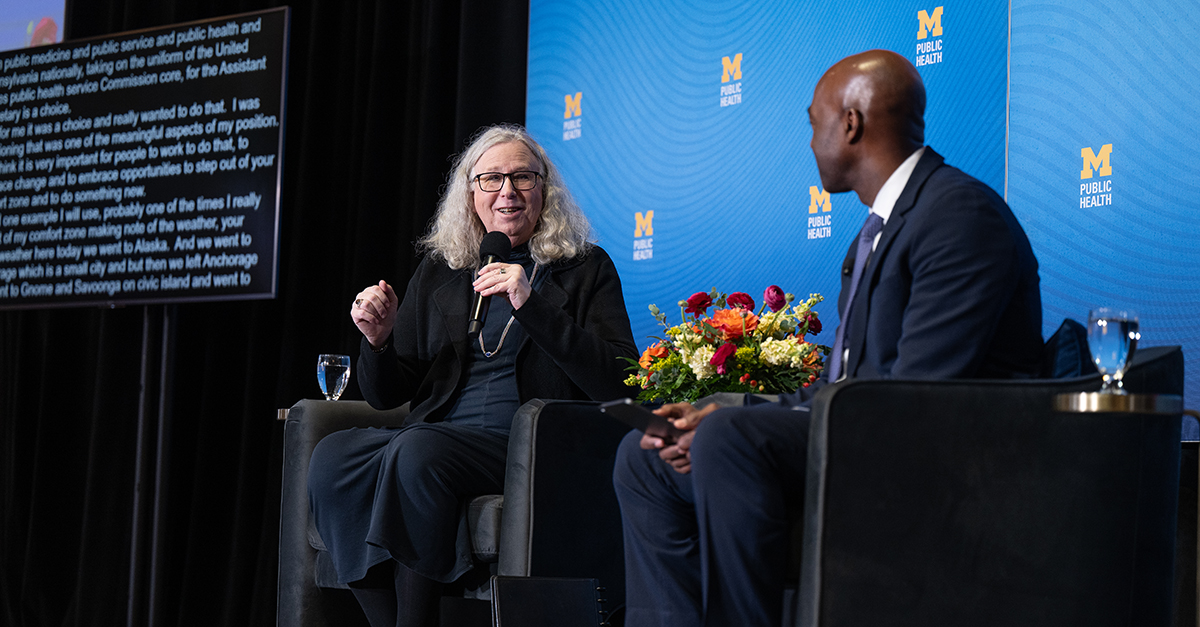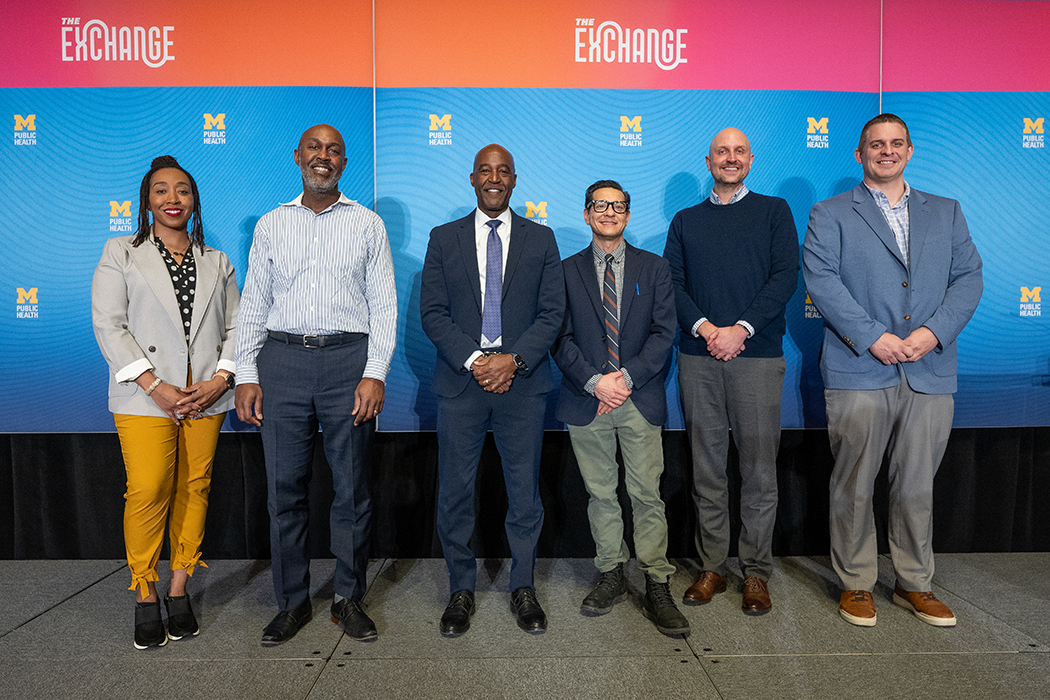Dr. Rachel Levine: Health equity is essential, not ‘woke’

Keynote speaker sees a future where ‘everyone has the opportunity to achieve their highest possible level of health’
ANN ARBOR—Health equity isn’t a “woke” concept. It is a fundamental necessity for a thriving society.
Dr. Rachel Levine, the former Assistant Secretary for Health for the US Department of Health and Human Services (HHS), delivered this key message during the “Health and Gender Equity in the Modern Era” seminar. The University of Michigan School of Public Health hosted the seminar, the latest in the biannual speaker series, The Exchange: Critical Conversations with Michigan Public Health, held on February 18 at the Michigan League Ballroom.
“There are some people today suggesting that health equity is ‘woke’ or somehow divisive,” Levine said. “But if we have learned anything from COVID-19, and the opioid crisis as well, it is that health equity is fundamental to public health.”
Levine, who served as the 17th Assistant Secretary for Health U.S. and the head of the Public Health Service Commissioned Corps, has dedicated her career to improving the lives of all Americans by placing health equity at the forefront of public health discourse. Her distinguished career, spanning from academia to her leadership roles in Pennsylvania and at the federal level, reflects an unwavering commitment to tackling health disparities.
Before joining HHS, Levine served as Pennsylvania’s Physician General and later as
Secretary of Health, confronting pressing issues, including the opioid crisis and
behavioral health challenges. Her work has invariably focused on the intersection
between mental and physical health, especially the needs of marginalized populations.
F. DuBois Bowman, dean of Michigan Public Health, introduced Levine to the audience and also remarked on the importance of health equity.
“For those of us in public health, it’s clear that gender is a critical determinant of health,” Bowman said. “A person’s gender can influence their access to healthcare, the quality of care they receive and their overall well-being. We also observe how policy can shape access to care based on gender, a dynamic currently unfolding at both the federal and state levels, with significant variations across different states.”
This is a very difficult time for LGBTQIA+ elders and for the trans youth and their families. Political and ideological attacks against our rainbow family are not grounded in science or evidence.”
— Dr. Rachel Levine
In her address, Levine underscored the importance of acknowledging and addressing the social determinants of health that perpetuate inequalities. She articulated a vision for a future where “everyone has the opportunity to achieve their highest possible level of health,” a future free of the barriers posed by inequities.
Levine, however, cautioned that achieving this vision requires a collective effort and unwavering commitment from all sectors of society.
The seminar highlighted the urgency of addressing gender equity in healthcare, a theme vital to Levine’s work and advocacy.
“This is a very difficult time for LGBTQIA+ elders and for the trans youth and their families,” she said. “Political and ideological attacks against our rainbow family are not grounded in science or evidence.
“Let’s be specific: Gender-affirming care is essential healthcare. It serves as mental health support, acts as suicide prevention, improves quality of life and literally saves lives. This care is based on decades of study and is an evidence-based standard of medical treatment which, of course, has evolved and changed over time. They have for transgender medicine no differently than they have for the treatment of type 2 diabetes over the last 10 and 15 years.”
Navigating a complex landscape
In recent years, the political division has introduced new complexities to public health initiatives across the United States. During the event, discussion touched on how some states have enacted policies that codify health inequity, while others strive to protect and promote it. This uneven legislative landscape has implications far beyond policy—it influences the lived experiences of countless individuals seeking equitable care.
The resulting disjointed approach to healthcare in the US complicates the quest for national health equity. Levine highlighted the critical role that public health universities, policymakers and community leaders must play in advocating for policies that support health and gender equity.
She stressed that enduring vigilance is necessary to ensure that progress is made—and maintained.
“In regards to reproductive health, the devastating impact of the Dobbs decision has led to a patchwork of laws throughout our country that confuse and complicate public health,” Levine said. “Reproductive health is public health, and the full range of reproductive healthcare options are necessary, including abortions.”
Confronting misinformation and trust Issues
Levine also addressed the pervasive issue of misinformation, which exacerbates public health challenges and often erodes public trust. She noted that vaccine hesitancy has roots in misinformation that dates back decades, presenting an ongoing barrier to achieving public health goals.
“Trust is critical in medicine and public health, and it's our responsibility to earn that trust back,” she said.
The rise of social media and decentralized information channels has only accelerated the spread of misinformation. While acknowledging the complexities of combating misinformation, Levine emphasized the need for a robust commitment to factual, science-based public health communication strategies. She called for innovative approaches to public health messaging that would resonate with diverse audiences and counter misinformation effectively.
We haven't made progress unless we’ve all made progress.”
— Dr. Rachel Levine
Climate change and health equity
Levine explored how broader global challenges such as climate change intersect with health equity. The disproportionate impact of climate change on vulnerable communities is undeniable.
“The health impacts of climate change are significant,” Levine said, noting that marginalized communities often bear the brunt of environmental shifts.
She emphasized the necessity of resilient healthcare systems capable of responding to these climate-related stresses.
Levine called for a unified effort to recognize and address the health inequities exacerbated by climate change. She urged public health professionals to take a proactive stance on environmental health issues, advocating for policies that prioritize climate resilience across all levels of society.
Building resilient communities
Despite the many challenges discussed, Levine remains optimistic about the future of public health. She encouraged public health professionals and students alike to embrace change and to step boldly into leadership roles that challenge traditional boundaries.
“Pessimism and despair do not motivate us to do our work,” she said.
Instead, Levine emphasized the power of optimism and a proactive approach in driving collective progress toward a more equitable and inclusive world.
Her call to action was clear and compelling. For Levine, the pursuit of health equity is not just about addressing current disparities; it's about building a world where everyone, regardless of their background, has the opportunity to thrive.
She emphasized that achieving this vision demands collaboration, innovative thinking and a commitment to protecting and advancing the health rights of all individuals.
“We haven't made progress unless we’ve all made progress,” Levine said.
As societal challenges evolve, so too must the strategies and solutions within public health continue to grow in imagination and impact.
“For those of us in public health, it’s clear that gender is a critical determinant of health. A person’s gender can influence their access to healthcare, the quality of care they receive and their overall well-being.”
— Dean F. DuBois Bowman
Expert panel on gender equity
Following the seminar, community experts discussed the work happening in Michigan to address health and gender equity, and the ongoing research taking place at Michigan Public Health.
The expert panel featured: Sari Reisner, associate professor of Epidemiology; Eli Savit, prosecuting attorney for Washtenaw County; Daphne Watkins, the Letha A. Chadiha Collegiate Professor of Social Work at the University of Michigan; and moderator Justin Colacino, associate professor of Environmental Health Sciences and Nutritional Sciences. Colacino is also a co-lead of Public Health IDEAS for Building Health Equity with Enrique Neblett, professor of Health Behavior & Health Equity, who introduced the panel.
During the panel, diverse perspectives were shared on maintaining gender and health equity in shifting political landscapes. Reisner, a transgender population scientist, emphasized the scientific basis for understanding gender as a determinant of health.
“Gender-affirming care is life-saving,” he said. “It's a mental health intervention on par with other treatments we see for depression.”
Watkins highlighted the challenges Black men face in the healthcare system and stressed the need for culturally sensitive and gender-specific interventions.
“I want to highlight the unique challenges faced by Black men in particular when it comes to mental health stigma, because it’s so important for us to think about what I like to call culturally sensitive, gender-specific and age-appropriate care,” she said.
Savit discussed the intersections between public health and crime, pointing to how equitable healthcare access can prevent victimization and criminal behavior.
“Public health and crime are deeply, deeply interrelated,” he said. “I’m a prosecutor that does not particularly want to prosecute cases, because once we are prosecuting cases, it means that a crime has already occurred. Health is the best crime prevention tool we have because helping families is crucial for community safety.”
The panelists collectively stressed the need for continued advocacy, emphasizing that interdisciplinary collaboration across academia, government and community sectors is crucial for advancing health equity.


